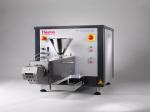Manufactured By: Thermo Fisher Scientific
The Thermo Scientific HAAKE PolyLab QC is a new measuring mixer & extruder system that meets todays and future quality control (QC) needs. The modular torque rheometer can be connected to an interchangeable mixer, single-screw extruder, or conical twin-screw extruder. Combining proven technology and state-of-the-art hardware and software with an easy-to-use interface that is the future of QC, today.
The HAAKE PolyLab QC is offered as a bench and floor model that best fits into a customer’s lab environment. The optional rack (floor model) allows moving the instrument away or even storing it if needed. Benefit from flexibility in footprint and weight!
Based on the system’s backwards compatibility, even existing measuring mixers and extruders can be connected. Most of the connections are almost at the same place as they used to be and can be connected either directly or with an optional adapter.
A typical mixer test is run at a defined rotor speed (shear rate). The material’s response to the shear is recorded as torque and displayed versus time. As a material’s properties are very sensitive to temperature, the mixer chamber is separated into different sections. These are individually temperature-controlled by the Thermo Scientific HAAKE PolyLab QC. Optimum temperature control quality can be achieved by an automated recognition of the connected mixer.
Although the temperature of the mixing chamber is constantly controlled, the material’s melt temperature during a test may rise due to the shear introduced. The melt temperature is also recorded during the test by a separate thermocouple. The recorded “Rheogram” (torque and melt temperature vs. time at constant speed) is characteristic for different material types and blends. It can be used as a fingerprint in quality control for outgoing and incoming product inspections. As changes in torque are related to structural changes in the material, a Rheogram can be used to investigate and verify reactions of different additive types or concentrations on the sample’s melting behaviour.
Typical Investigations
Performing electric conductivity measurements for rubber mixtures
Measuring Methods
Capillary Viscosity
Measuring Options
Mixing, Kneading, Compounding, Plasticising
Melting. Conveying, Compressing, Compounding
Additional Product Information:
| Item | Size | Download |
|---|---|---|
| Product Brochure | 467kb | Download |
| Product Specifications | 375kb | Download |

